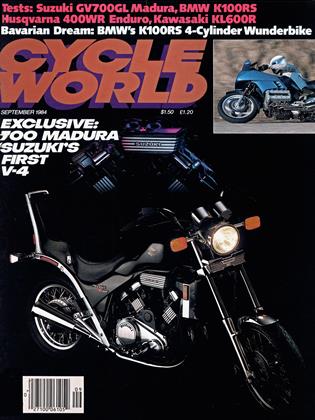CYCLE WORLD FOLLOW UP
Yamaha YZ490 Z-spokes
The YZ490 Yamaha we tested in the July 1984 issue survived its month-long test period without any major spoke problems other than the normal occasional loosening when the bike was new. But after the test was written, one of our pro test riders raced our YZ490 on a motocross track that has a lot of stadium-style jumps, and disaster struck: Nine spokes in the rear wheel broke before practice was finished. He then borrowed a rear wheel from a 1983 YZ490 and raced two motos with no problems.
Since our test, we’ve seen numerous ’84 YZ490s suffer these kinds of rearspoke breakages at local races. The accepted fix is to use a 1983 YZ490 wheel laced with 8-gauge spokes er, the nonZ-type, that is.
VF500F Interceptor
l?emember the title we used for our 500 Interceptor road test? “A Backroad Dancer With A 12,000-Rpm Heart Of Gold,” was what we said. Well, our test Interceptor had something more like a heart of bad babbitt. While being ridden vigorously down a mountain road a week or so after the conclusion of the test, the Interceptor developed a knocking noise somewhere inside the engine. We stopped the bike on the spot and trucked it back to our offices, where a preliminary investigation failed to disclose the cause of the knocking. No bent valves, no broken clutch hub, nothing out of the ordinary—except the sound. Further teardown disclosed the problem: The connecting-rod bearing for the right-rear cylinder had failed.
At this point we don’t know why the rod bearing failed or if this type of failure is likely to occur on other 500 Interceptors. We do know that Honda has discovered a crankshaft problem on about 1200 VF500F models that could lead to crankshaft breakage. Honda is recommending that the owners of these bikes keep engine speed below 10,000 rpm until the engine can be replaced under warranty. Serial numbers for bikes with the crankshaft problem are 0001839 through 0002779 for 49-state Interceptors, and 0000255 through 0000584 for California models. Our test bike had one of the affected serial numbers, but the rod-bearing failure does not appear to be related to the crankshaft defect.
The 500 Interceptor is a wonderful motorcycle, clearly the head of its class in on-the-road performance, even if not the absolute king of the dragstrip. But the reliability of early models has left something to be desired. Despite Honda doing everything a manufacturer should do to correct problems and honor warranties, only time—and bottom-end components that don’t fail—can restore the 500 Interceptor’s reputation.
Yamaha XT600 stumble
In our test of the Yamaha dual-purpose XT600, we noted a slight hesitation between 4000 and 5000 rpm. We suspected the dual-stage carburetion.
We put more miles on the XT after its test period and the stumbling got worse; so bad, in fact, that we took the bike to a local Yamaha dealer for a tuneup after first trying all the usual troubleshooting techniques. Eighty-four dollars and a session on the exhaust-gas analyzer later, the XT ran better but the hesitation was still there.
Next, we dropped the bike off at Yamaha’s engineering department. There, the XT was checked over. The tune-up specs were OK and the carburetor settings were OK, the Yamaha guys said, so it’s got to be some kind of electrical problem.
At presstime, the electrical gremlin remained untraced. We’ll let you know next month what the problem was. S
 View Full Issue
View Full Issue
More From This Issue
-
 Departments
DepartmentsCycle World Editorial
SEPTEMBER 1984 By Paul Dean -
 Letters
LettersCycle World Letters
SEPTEMBER 1984 -
 Departments
DepartmentsCycle World Summary
SEPTEMBER 1984 -
 Departments
DepartmentsCycle World Roundup
SEPTEMBER 1984 -
 Features
FeaturesThe Widow
SEPTEMBER 1984 By David Edwards -
 Features
FeaturesLong-Term Test: Harley-Davidson Fxrs
SEPTEMBER 1984





